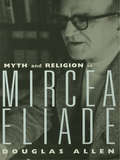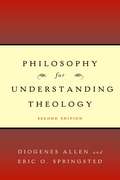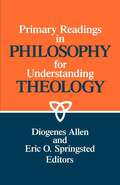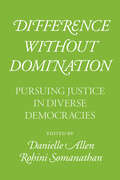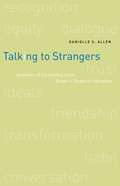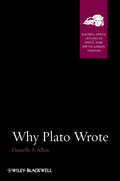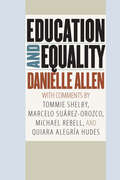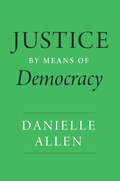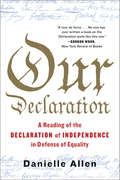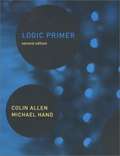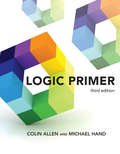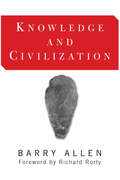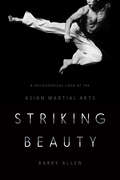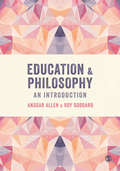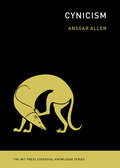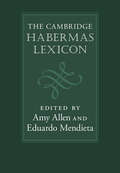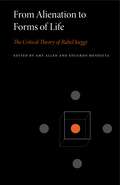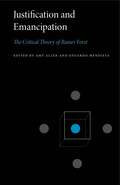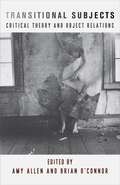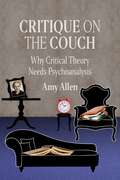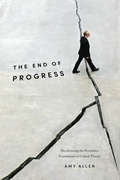- Table View
- List View
Myth and Religion in Mircea Eliade (Theorists Of Myth Ser. #Vol. 11)
by Douglas AllenThis multidisciplinary study is the first book devoted entirely to the critical interpretation of the writings of Mircea Eliade on myth. One of the most popular and influential historians and theorists of myth, Eliade argued that all myth is religious. Douglas Allen critically interprets Eliade's theories of religion, myth, and symbolism and analys
Philosophy for Understanding Theology, Second Edition
by Diogenes Allen Eric O. SpringstedThis new edition of Philosophy for Understanding Theology adds chapters on postmodernism and questions of the self and the good to bring the book up to date with current scholarship. It introduces students to the influence that key philosophers and philosophical movement through the centuries have had on shaping Christian theology in both its understandings and forms of expression
Primary Readings in Philosophy for Understanding Theology
by Diogenes Allen Eric O. SpringstedKnowledge of key philosophic terms or concepts is vital to the understanding of many issues in Christian theology. Diogenes Allen's book Philosophy for Understanding Theology explores such terms and concepts and their relationship to theology. This new anthology, edited by Allen and Eric Springsted, provides primary texts undergirding that earlier work. The writings included here deal with philosophical issues crucial to the understanding of theology and include responses to those questions from Plato to the present. Whether used alone or as a companion volume, this new reader is a valuable resource for theological studies.
Difference without Domination: Pursuing Justice in Diverse Democracies
by Danielle Allen Rohini SomanathanAround the globe, democracy appears broken. With political and socioeconomic inequality on the rise, we are faced with the urgent question of how to better distribute power, opportunity, and wealth in diverse modern societies. This volume confronts the dilemma head-on, exploring new ways to combat current social hierarchies of domination. Using examples from the United States, India, Germany, and Cameroon, the contributors offer paradigm-changing approaches to the concepts of justice, identity, and social groups while also taking a fresh look at the idea that the demographic make-up of institutions should mirror the make-up of a populace as a whole. After laying out the conceptual framework, the volume turns to a number of provocative topics, among them the pernicious tenacity of implicit bias, the logical contradictions inherent to the idea of universal human dignity, and the paradoxes and problems surrounding affirmative action. A stimulating blend of empirical and interpretive analyses, Difference without Domination urges us to reconsider the idea of representation and to challenge what it means to measure equality and inequality.
Talking to Strangers: Anxieties of Citizenship since Brown v. Board of Education
by Danielle S. Allen"Don't talk to strangers" is the advice long given to children by parents of all classes and races. Today it has blossomed into a fundamental precept of civic education, reflecting interracial distrust, personal and political alienation, and a profound suspicion of others. In this powerful and eloquent essay, Danielle Allen, a 2002 MacArthur Fellow, takes this maxim back to Little Rock, rooting out the seeds of distrust to replace them with "a citizenship of political friendship. "Returning to the landmark Brown v. Board of Education decision of 1954 and to the famous photograph of Elizabeth Eckford, one of the Little Rock Nine, being cursed by fellow "citizen" Hazel Bryan, Allen argues that we have yet to complete the transition to political friendship that this moment offered. By combining brief readings of philosophers and political theorists with personal reflections on race politics in Chicago, Allen proposes strikingly practical techniques of citizenship. These tools of political friendship, Allen contends, can help us become more trustworthy to others and overcome the fossilized distrust among us. Sacrifice is the key concept that bridges citizenship and trust, according to Allen. She uncovers the ordinary, daily sacrifices citizens make to keep democracy working and offers methods for recognizing and reciprocating those sacrifices. Trenchant, incisive, and ultimately hopeful, Talking to Strangers is nothing less than a manifesto for a revitalized democratic citizenry.
Why Plato Wrote (Blackwell-Bristol Lectures on Greece, Rome and the Classical Tradition #2)
by Danielle S. AllenWhy Plato Wrote argues that Plato was not only the world’s first systematic political philosopher, but also the western world’s first think-tank activist and message man. Shows that Plato wrote to change Athenian society and thereby transform Athenian politics Offers accessible discussions of Plato’s philosophy of language and political theory Selected by Choice as an Outstanding Academic Title for 2011
Education and Equality
by Danielle AllenAmerican education as we know it today--guaranteed by the state to serve every child in the country--is still less than a hundred years old. It's no wonder we haven't agreed yet as to exactly what role education should play in our society. In these Tanner Lectures, Danielle Allen brings us much closer, examining the ideological impasse between vocational and humanistic approaches that has plagued educational discourse, offering a compelling proposal to finally resolve the dispute. Allen argues that education plays a crucial role in the cultivation of political and social equality and economic fairness, but that we have lost sight of exactly what that role is and should be. Drawing on thinkers such as John Rawls and Hannah Arendt, she sketches out a humanistic baseline that re-links education to equality, showing how doing so can help us reframe policy questions. From there, she turns to civic education, showing that we must reorient education's trajectory toward readying students for lives as democratic citizens. Deepened by commentaries from leading thinkers Tommie Shelby, Marcelo Suárez-Orozco, Michael Rebell, and Quiara Alegría Hudes that touch on issues ranging from globalization to law to linguistic empowerment, this book offers a critical clarification of just how important education is to democratic life, as well as a stirring defense of the humanities.
Justice by Means of Democracy
by Danielle AllenFrom leading thinker Danielle Allen, a bold and urgent articulation of a new political philosophy: power-sharing liberalism. At a time of great social and political turmoil, when many residents of the leading democracies question the ability of their governments to deal fairly and competently with serious public issues, and when power seems more and more to rest with the wealthy few, this book reconsiders the very foundations of democracy and justice. Scholar and writer Danielle Allen argues that the surest path to a just society in which all are given the support necessary to flourish is the protection of political equality; that justice is best achieved by means of democracy; and that the social ideals and organizational design principles that flow from recognizing political equality and democracy as fundamental to human well-being provide an alternative framework not only for justice but also for political economy. Allen identifies this paradigm-changing new framework as “power-sharing liberalism.” Liberalism more broadly is the philosophical commitment to a government grounded in rights that both protect people in their private lives and empower them to help govern public life. Power-sharing liberalism offers an innovative reconstruction of liberalism based on the principle of full inclusion and non-domination—in which no group has a monopoly on power—in politics, economy, and society. By showing how we all might fully share power and responsibility across all three sectors, Allen advances a culture of civic engagement and empowerment, revealing the universal benefits of an effective government in which all participate on equal terms.
Our Declaration: A Reading of the Declaration of Independence in Defense of Equality
by Danielle AllenWinner of the Zócalo Book Prize Shortlisted for the 2015 PEN/John Kenneth Galbraith Award Winner of the Francis Parkman Prize, Society of American Historians "A tour de force. . . . No one has ever written a book on the Declaration quite like this one."--Gordon Wood, New York Review of Books Featured on the front page of the New York Times, Our Declaration is already regarded as a seminal work that reinterprets the promise of American democracy through our founding text. Combining a personal account of teaching the Declaration with a vivid evocation of the colonial world between 1774 and 1777, Allen, a political philosopher renowned for her work on justice and citizenship reveals our nation's founding text to be an animating force that not only changed the world more than two-hundred years ago, but also still can. Challenging conventional wisdom, she boldly makes the case that the Declaration is a document as much about political equality as about individual liberty. Beautifully illustrated throughout, Our Declaration is an "uncommonly elegant, incisive, and often poetic primer on America's cardinal text" (David M. Kennedy).
Logic Primer
by Colin Allen Michael Hand<P>Logic Primer presents a rigorous introduction to natural deduction systems of sentential and first-order logic.<P> The text is designed to foster the student-instructor relationship. <P>The key concepts are laid out in concise definitions and comments, with the expectation that the instructor will elaborate upon them. <P>New to the second edition is the addition of material on the logic of identity in chapters 3 and 4.<P> An innovative interactive Web site, consisting of a "Logic Daemon" and a "Quizmaster," encourages students to formulate their own proofs and links them to appropriate explanations in the book.
Logic Primer, third edition
by Colin Allen Michael HandThe new edition of a comprehensive and rigorous but concise introduction to symbolic logic.Logic Primer offers a comprehensive and rigorous introduction to symbolic logic, providing concise definitions of key concepts, illustrative examples, and exercises. After presenting the definitions of validity and soundness, the book goes on to introduce a formal language, proof theory, and formal semantics for sentential logic (chapters 1–3) and for first-order predicate logic (chapters 4–6) with identity (chapter 7). For this third edition, the material has been reorganized from four chapters into seven, increasing the modularity of the text and enabling teachers to choose alternative paths through the book. New exercises have been added, and all exercises are now arranged to support students moving from easier to harder problems. Its spare and elegant treatment makes Logic Primer unique among textbooks. It presents the material with minimal chattiness, allowing students to proceed more directly from topic to topic and leaving instructors free to cover the subject matter in the way that best suits their students. The book includes more than thirty exercise sets, with answers to many of them provided in an appendix. The book&’s website allows students to enter and check proofs, truth tables, and other exercises interactively.
Knowledge And Civilization
by Barry AllenOffers a new, original way of framing questions about knowledge. Knowledge and Civilization advances detailed criticism of philosophy's usual approach to knowledge and describes a redirection, away from textbook problems of epistemology, toward an ecological philosophy of technology and civilization. Rejecting theories that confine knowledge to language or discourse, Allen situates knowledge in the greater field of artifacts, technical performance, and human evolution. His wide ranging considerations draw on ideas from evolutionary biology, archaeology, anthropology, and the history of cities, art, and technology.
Striking Beauty
by Barry AllenThe first book to focus on the intersection of Western philosophy and the Asian martial arts, Striking Beauty collapses the boundaries between Eastern and Western thought, comparatively studying the historical and philosophical traditions of martial arts practice and their ethical value in the modern world. Expanding Western philosophy's global outlook, the book forces a theoretical reckoning with the concerns of Chinese philosophy and the aesthetic and technical dimensions of martial arts practice. Striking Beauty explains the relationship between Asian martial arts and the Chinese philosophical traditions of Confucianism, Buddhism, and Daoism in addition to the strategic wisdom of Sunzi's Art of War. It connects martial arts practice to the Western concepts of mind-body dualism and materialism, sports aesthetics, and the ethics of violence. Incorporating innovations in body phenomenology, somaesthetics, and embodied cognition, the work ameliorates Western philosophy's hostility toward the body, emphasizing the pleasure of watching and engaging in martial arts, along with their beauty and the ethical problem of their violence.
Striking Beauty: A Philosophical Look at the Asian Martial Arts
by Barry AllenThe first book to focus on the intersection of Western philosophy and the Asian martial arts, Striking Beauty comparatively studies the historical and philosophical traditions of martial arts practice and their ethical value in the modern world. Expanding Western philosophy's global outlook, the book forces a theoretical reckoning with the concerns of Chinese philosophy and the aesthetic and technical dimensions of martial arts practice.Striking Beauty explains the relationship between Asian martial arts and the Chinese philosophical traditions of Confucianism, Buddhism, and Daoism, in addition to Sunzi's Art of War. It connects martial arts practice to the Western concepts of mind-body dualism and materialism, sports aesthetics, and the ethics of violence. The work ameliorates Western philosophy's hostility toward the body, emphasizing the pleasure of watching and engaging in martial arts, along with their beauty and the ethical problem of their violence.
Vanishing into Things: Knowledge in Chinese Tradition
by Barry AllenVanishing into Things explores the concept of knowledge in Chinese thought over two millennia, from Confucius to Wang Yangming (ca. 1500 CE), and compares the different philosophical imperatives that have driven Chinese and Western thought. Challenging the hyperspecialized epistemology of modern philosophy in the West, Barry Allen urges his readers toward an ethical appreciation of why knowledge is worth pursuing.<P><P>Western philosophers have long maintained that true knowledge is the best knowledge. Chinese thinkers, by contrast, have emphasized not the essence of knowing but the purpose. Ideas of truth play no part in their understanding of what the best knowledge is: knowledge is not deduced from principles or reducible to a theory. Rather, in Chinese tradition knowledge is expressed through wu wei, literally “not doing”―a response to circumstances that is at once effortless and effective. This type of knowledge perceives the evolution of circumstances from an early point, when its course can still be changed, provided one has the wisdom to grasp the opportunity.
Education and Philosophy: An Introduction
by Ansgar Allen Roy GoddardPhilosophy is vital to the study of education, and a sound knowledge of different philosophical perspectives leads to a deeper engagement with the choices and commitments you make within your educational practice. This introductory text provides a core understanding of key moments in the history of Western philosophy. By introducing key transition points in that history, it investigates the plight of present day education, a period in which the aims and purposes of education have become increasingly unclear, leaving education open to the rise of instrumentalism and the forces of capital. Accessibly written, the book carefully analyses the common assumptions and conflicted history of education, provoking questioning about its nature and purposes. The authors argue vigorously that thinking critically about education from a philosophical perspective will give practicing and trainee teachers, as well as students on undergraduate Education and Masters-level courses a fuller command of their own role and context.
Education and Philosophy: An Introduction
by Ansgar Allen Roy GoddardPhilosophy is vital to the study of education, and a sound knowledge of different philosophical perspectives leads to a deeper engagement with the choices and commitments you make within your educational practice. This introductory text provides a core understanding of key moments in the history of Western philosophy. By introducing key transition points in that history, it investigates the plight of present day education, a period in which the aims and purposes of education have become increasingly unclear, leaving education open to the rise of instrumentalism and the forces of capital. Accessibly written, the book carefully analyses the common assumptions and conflicted history of education, provoking questioning about its nature and purposes. The authors argue vigorously that thinking critically about education from a philosophical perspective will give practicing and trainee teachers, as well as students on undergraduate Education and Masters-level courses a fuller command of their own role and context.
Cynicism (The MIT Press Essential Knowledge Series)
by Ansgar AllenA short history of cynicism, from the fearless speech of the ancient Greeks to the jaded negativity of the present. Everyone's a cynic, yet few will admit it. Today's cynics excuse themselves half-heartedly—“I hate to be a cynic, but..."—before making their pronouncements. Narrowly opportunistic, always on the take, contemporary cynicism has nothing positive to contribute. The Cynicism of the ancient Greeks, however, was very different. This Cynicism was a marginal philosophy practiced by a small band of eccentrics. Bold and shameless, it was committed to transforming the values on which civilization depends. In this volume of the MIT Press Essential Knowledge series, Ansgar Allen charts the long history of cynicism, from the “fearless speech” of Greek Cynics in the fourth century BCE to the contemporary cynic's lack of social and political convictions.Allen describes ancient Cynicism as an improvised philosophy and a way of life disposed to scandalize contemporaries, subjecting their cultural commitments to derision. He chronicles the subsequent “purification” of Cynicism by the Stoics; Renaissance and Enlightenment appropriations of Cynicism, drawing on the writings of Shakespeare, Rabelais, Rousseau, de Sade, and others; and the transition from Cynicism (the philosophy) to cynicism (the modern attitude), exploring contemporary cynicism from the perspectives of its leftist, liberal, and conservative critics. Finally, he considers the possibility of a radical cynicism that admits and affirms the danger it poses to contemporary society.
The Cambridge Habermas Lexicon
by Amy Allen Eduardo MendietaOver a career spanning nearly seven decades, Jürgen Habermas - one of the most important European philosophers of the twentieth and twenty-first centuries - has produced a prodigious and influential body of work. In this Lexicon, authored by an international team of scholars, over 200 entries define and explain the key concepts, categories, philosophemes, themes, debates, and names associated with the entire constellation of Habermas's thought. The entries explore the historical, philosophical and social-theoretic roots of these terms and concepts, as well as their intellectual and disciplinary contexts, to build a broad but detailed picture of the development and trajectory of Habermas as a thinker. The volume will be an invaluable resource for students and scholars of Habermas, as well as for other readers in political philosophy, political science, sociology, international relations, cultural studies, and law.
From Alienation to Forms of Life: The Critical Theory of Rahel Jaeggi (Penn State Series in Critical Theory #1)
by Amy Allen Eduardo MendietaThe wide-ranging work of Rahel Jaeggi, a leading voice of the new generation of critical theorists, demonstrates how core concepts and methodological approaches in the tradition of the Frankfurt School can be updated, stripped of their dubious metaphysical baggage, and made fruitful for critical theory in the twenty-first century. In this thorough introduction to Jaeggi’s work for English-speaking audiences, scholars assess and critique her efforts to revitalize critical theory.Jaeggi’s innovative work reclaims key concepts of Hegelian-Marxist social philosophy and reads them through the lens of such thinkers as Adorno, Heidegger, and Dewey, while simultaneously putting them into dialogue with contemporary analytic philosophy. Structured for classroom use, this critical introduction to Rahel Jaeggi is an insightful and generative confrontation with the most recent transformation of Frankfurt School–inspired social and philosophical critical theory. This volume features an essay by Jaeggi on moral progress and social change, essays by leading scholars engaging with her conceptual analysis of alienation and the critique of forms of life, and a Q&A between Jaeggi and volume coeditor Amy Allen. For scholars and students wishing to engage in the debate with key contemporary thinkers over the past, present, and future(s) of critical theory, this volume will be transformative.
Justification and Emancipation: The Critical Theory of Rainer Forst (Penn State Series in Critical Theory #2)
by Amy Allen Eduardo MendietaThis work is both an introduction to and a critical appraisal of the work of Rainer Forst, one of the most important political theorists in Germany today. Structured for classroom use, this collection of original essays engages with Forst’s extant corpus in ways that are both appreciative and critical.Forst is an original, prolific, and widely known member of the “fourth generation” of Frankfurt School theorists. His significant contributions include a Rawlsian-Habermasian conception of justice that takes seriously the dissent of citizens and moral agents; an original interpretation and analysis of the concept of toleration; and, most recently, a generative idea of “noumenal power,” to which every human being has a claim by virtue of their equal standing within the moral community of all rational beings. Opening with an essay by Forst on the normative conception of progress and closing with a reply to his critics, this volume is both a primer on and a window into the latest contributions to the tradition of critical theory.In addition to the editors, the contributors include John Christman, Mattias Iser, Catherine Lu, John P. McCormick, Sarah Clark Miller, and Melissa Yates.
Transitional Subjects: Critical Theory and Object Relations (New Directions in Critical Theory #67)
by Amy Allen Axel Honneth C. Fred Alford James Martel Owen Hulatt Joel Whitebook Johanna Meehan Noëlle McAfee Alessandro Ferrera Sara BeardsworthCritical social theory has long been marked by a deep, creative, and productive relationship with psychoanalysis. Whereas Freud and Fromm were important cornerstones for the early Frankfurt School, recent thinkers have drawn on the object-relations school of psychoanalysis. Transitional Subjects is the first book-length collection devoted to the engagement of critical theory with the work of Melanie Klein, Donald Winnicott, and other members of this school. Featuring contributions from some of the leading figures working in both of these fields, including Axel Honneth, Joel Whitebook, Noëlle McAfee, Sara Beardsworth, and C. Fred Alford, it provides a synoptic overview of current research at the intersection of these two theoretical traditions while also opening up space for further innovations.Transitional Subjects offers a range of perspectives on the critical potential of object-relations psychoanalysis, including feminist and Marxist views, to offer valuable insight into such fraught social issues as aggression, narcissism, “progress,” and torture. The productive dialogue that emerges augments our understanding of the self as intersubjectively and socially constituted and of contemporary “social pathologies.” Transitional Subjects shows how critical theory and object-relations psychoanalysis, considered together, have not only enriched critical theory but also invigorated psychoanalysis.
From Alienation to Forms of Life: The Critical Theory of Rahel Jaeggi (Penn State Series in Critical Theory)
by Amy Allen Robin Celikates John Christman Rahel Jaeggi Daniel Loick Eduardo Mendieta Frederick Neuhouser Max Pensky Rocío ZambranaThe wide-ranging work of Rahel Jaeggi, a leading voice of the new generation of critical theorists, demonstrates how core concepts and methodological approaches in the tradition of the Frankfurt School can be updated, stripped of their dubious metaphysical baggage, and made fruitful for critical theory in the twenty-first century. In this thorough introduction to Jaeggi’s work for English-speaking audiences, scholars assess and critique her efforts to revitalize critical theory.Jaeggi’s innovative work reclaims key concepts of Hegelian-Marxist social philosophy and reads them through the lens of such thinkers as Adorno, Heidegger, and Dewey, while simultaneously putting them into dialogue with contemporary analytic philosophy. Structured for classroom use, this critical introduction to Rahel Jaeggi is an insightful and generative confrontation with the most recent transformation of Frankfurt School–inspired social and philosophical critical theory. This volume features an essay by Jaeggi on moral progress and social change, essays by leading scholars engaging with her conceptual analysis of alienation and the critique of forms of life, and a Q&A between Jaeggi and volume coeditor Amy Allen. For scholars and students wishing to engage in the debate with key contemporary thinkers over the past, present, and future(s) of critical theory, this volume will be transformative.
Critique on the Couch: Why Critical Theory Needs Psychoanalysis (New Directions in Critical Theory #73)
by Amy AllenDoes critical theory still need psychoanalysis? In Critique on the Couch, Amy Allen offers a cogent and convincing defense of its ongoing relevance.Countering the overly rationalist and progressivist interpretations of psychoanalysis put forward by contemporary critical theorists such as Jürgen Habermas and Axel Honneth, Allen argues that the work of Melanie Klein offers an underutilized resource. She draws on Freud, Klein, and Lacan to develop a more realistic strand of psychoanalytic thinking that centers on notions of loss, negativity, ambivalence, and mourning. Far from leading to despair, such an understanding of human subjectivity functions as a foundation of creativity, productive self-transformation, and progressive social change.At a time when critical theorists are increasingly returning to psychoanalytic thought to diagnose the dysfunctions of our politics, this book opens up new ways of understanding the political implications of psychoanalysis while preserving the progressive, emancipatory aims of critique.
The End of Progress: Decolonizing the Normative Foundations of Critical Theory
by Amy AllenRethinking the future of critical theory in the wake of postcolonial critique.
